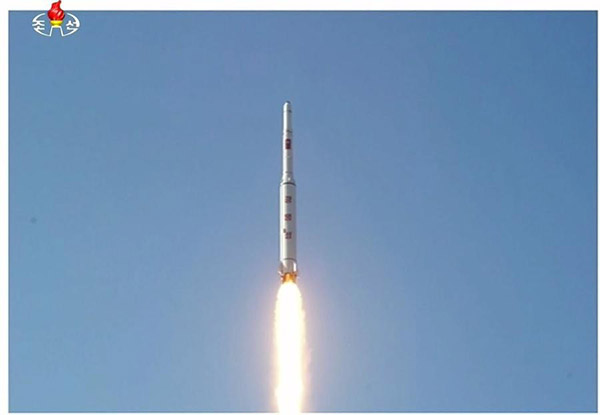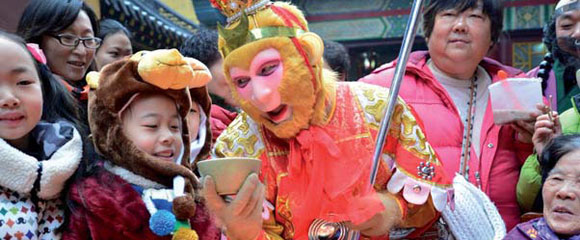Sanctions, not THAAD, are cure for peninsula crisis
Updated: 2016-02-15 07:16
(China Daily)
|
|||||||||||
 |
|
Democratic People's Republic of Korea launches a long range rocket launched into the air in this file still image taken from KRT video footage, released by Yonhap on February 7, 2016. [Photo/Agencies] |
It is a shame that, despite their repeated, constant claims of commitment to the denuclearization of the Korean Peninsula, the key stakeholding countries are once again in danger of looking on with folded arms as Pyongyang pushes the envelope.
Now that the People's Democratic Republic of Korea has conducted its fourth nuclear test and launched another carrier rocket, nuclearization of the peninsula has crossed a dangerous threshold. The threat of a nuclear-armed DPRK is more real than ever.
The stakeholders' conflicting geopolitical agendas and calculations have prevented them from forming a meaningful united front to contain Pyongyang's nuclear ambitions. Further foot-dragging may allow the latter's nuclear program and the security landscape of Northeast Asia to cross a hazardous Rubicon.
The United States, Japan and the Republic of Korea have vowed to work together and strive for a new, harsher United Nations resolution. China has also agreed the UN Security Council may pass a new resolution and take "further measures" to make the DPRK pay the necessary price for its behavior.
It sounds like the main stakeholders have finally agreed that the DPRK should not be allowed to go any further without paying a price that prohibits it from continuing along its nuclear path.
And that is far from enough. Especially as Beijing and Washington are yet to agree on exactly how harsh that price should be.
But they do not have the luxury of time to figure it out. Pyongyang has taken full advantage of their divergences to pursue its nuclear ambitions. It will continue to do so with a quickened pace. The tension on the peninsula has also provided a precious excuse for Washington to bring in its Terminal High-Altitude Area Defense system. Because the ROK, feeling threatened, wants it.
To China, and Russia, however, deploying THAAD in the ROK would be a substantial security threat in itself. As the system's capabilities far exceed the protection necessary for neutralizing any threat from the DPRK.
So, in spite of all the rhetoric, disagreements surrounding THAAD have the potential to prevent any effective curbs on Pyongyang's nuclear program, something that threatens all the stakeholders.
THAAD should not get in the way of harsher UN sanctions, because the parties can actually negotiate an option without it being deployed. There will be no ground for its introduction should the parties agree to a sanctions package that is sufficient for Pyongyang to reevaluate its nuclear program.
For that to happen, the new UN resolution must truly bite.
Related Stories
US House sends DPRK sanction bill to Obama 2016-02-13 04:48
US steps up military pressure on DPRK over satellite launch 2016-02-09 20:42
S. Korea confirms DPRK satellite's successful launch into orbit 2016-02-09 10:26
Beijing warns against increasing tensions over DPRK's satellite 2016-02-08 13:15
Today's Top News
Global stock swings not caused by China factors
Russian PM warns against 'new cold war' at MSC
Einstein's gravitational waves detected
As Chinese celebrate, rest of world benefits
UK's Pinewood film studios eyes China expansion
'China's continuous growth benefits UK and the world'
China detects first imported case of Zika virus
Cameron expects even better ties with China
Hot Topics
Lunar probe , China growth forecasts, Emission rules get tougher, China seen through 'colored lens', International board,
Editor's Picks

|

|

|

|

|

|






